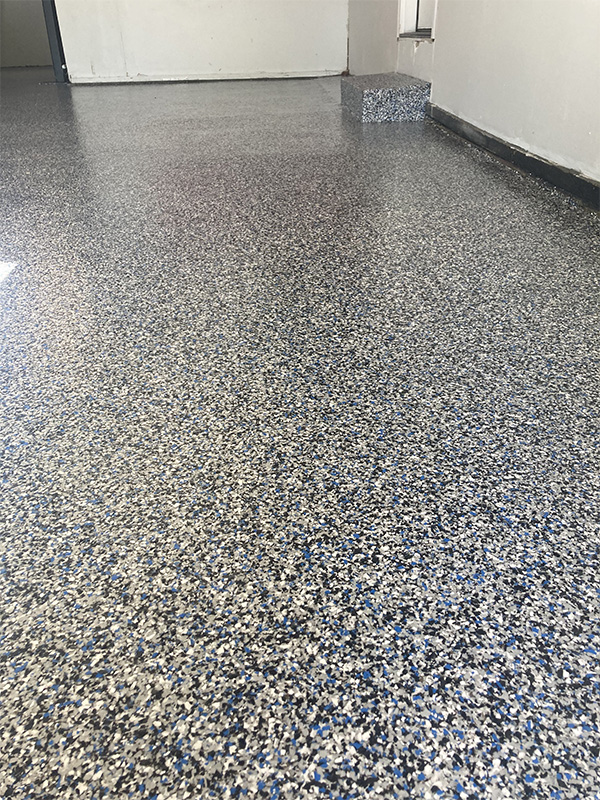Disadvantages of Epoxy
There are plenty of benefits and positives one can find in epoxy flooring. However, it’s also important to recognize the disadvantages of epoxy. No flooring surface is appropriate for all applications.
Your application may require a different resinous flooring system. Or it may need something entirely different, such as tile, LVT, polished concrete etc. We’ll explore the pros and cons of epoxy flooring to help you decide if it’s the right material for you.
Durability of Epoxy
Epoxy floor coatings are durable, but can be beaten out by other resinous flooring materials. In high wear and tear environments, such as a warehouse epoxy floor that is subject to forklift traffic, or even heavy foot traffic, a basic two coat epoxy coating floor is going to wear out.
To compensate for this, we build commercial epoxy flooring by adding aggregate and additional layers. We also use harder top coats, polyaspartics, urethanes or other materials. A thicker floor (usually 3-4 coats) lasts substantially longer.
Even with additional wear coats, an epoxy floor is never going to be as durable as other options. For example a polished concrete floor or a urethane cement floor. Epoxy floors are subject to chipping from heavy tool drops or gouges. Whereas other floors can simply dent, epoxy can experience chipping.
Durability can be customized and modified by a knowledgeable professional. We can build the appropriate floor for each application using simply epoxy or by mixing in other resinous flooring materials.
Appearance
Typically epoxy floors are not considered to be as decorative as other flooring options. The material lends itself more to an industrial and commercial kind of appearance.
A standard gray epoxy floor does not provide the visual excitement that other flooring materials do.
There are ways to improve the appearance of epoxy by broadcasting colored quartz sand into the epoxy material, or by building a flake epoxy floor or even by adding metallic pigment to the epoxy. While all of these floors look great, they are obviously limited by the fact that they are still an epoxy floor that achieves a certain appearance.

Installation Cost
The materials to make an epoxy floor are not remarkably expensive. Many don’t realize, however, that installing epoxy flooring is a labor intensive process. To do it right, it also requires skilled craftsmanship. The cost of epoxy flooring will be higher than some low-cost flooring options.
As one gets into specialty epoxy flooring, like electrostatic discharge epoxy, the costs also increase. Similarly a specialty hospital epoxy floor is going to be more expensive than an epoxy floor put into a garage or more basic application.
Slippery When Wet?
One of the other widely known epoxy cons is that epoxy can be slippery when its wet. There are a number of ways to remediate this disadvantage of epoxy. It needs to be considered, so you don’t have a skating rink of a floor with spilled water.
There are myriad ways to solve for slippery epoxy. The easiest way is to broadcast quartz sand (either uncolored or colored, depending on the desired appearance) into the epoxy. Vinyl flake can similarly be used. Broadcasting any aggregate will give the floor more of an orange peel texture.
Another solution is to add aluminum oxide or other non-slip additives like Shark Grip to the epoxy material. This will increase it’s non-skid properties.
In more extreme circumstances, aggregate like tiny ground up aluminum can be added for additional non-skid texture.
Water Incursion / Hydrostatic Pressure
Another disadvantage of epoxy flooring is that it is not as resistant to hydrostatic pressure or relative humidity in the underlying concrete slab as other materials such as urethane cement are. While manufacturers specifications vary, epoxy typically should not be installed on floors with a high relative humidity. Usually that first requires applying a moisture barrier or a urethane cement base.
While this is not simply a disadvantage of epoxy, and it applies to a wide range of floors, certain materials don’t have this issue.
To resolve high relative humidity, a concrete moisture mitigation system should be used. While sometimes this can be a relatively inexpensive primer or a urethane cement base coat, other flooring systems require a much more expensive mitigation effort.
Overcoming Disadvantages of Epoxy Flooring
Knowing some of the disadvantages of epoxy flooring helps you as a consumer to determine if it’s the right floor for you, but this article shouldn’t be the end of your research.
Epoxy floors, and more broadly, resinous flooring can be customized to solve nearly any disadvantage that these floors may provide. If you have additional questions or you’re considering installing an industrial or commercial epoxy floor in the Denver area, please don’t hesitate to reach out.
We’ve been installing resinous floors since 1989 and we’ve no doubt overcome whatever concerns you may have about the disadvantage of epoxy.
